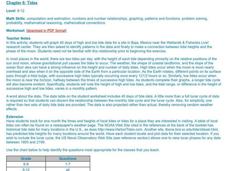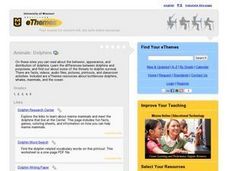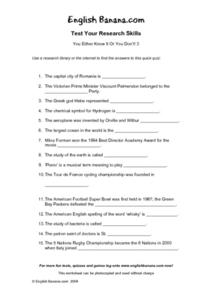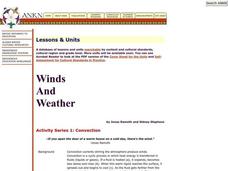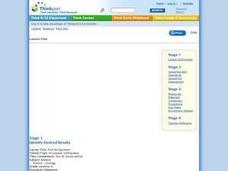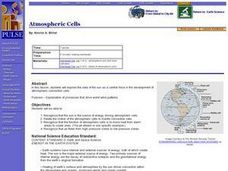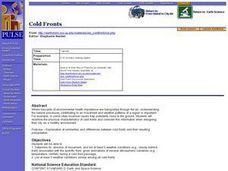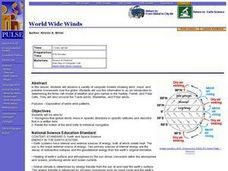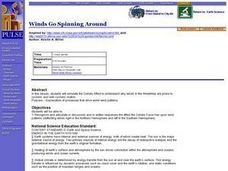Curated OER
Climate Change
Ninth graders compare the Arctic and Antarctic. For this climate lesson students work in groups, research and complete an oral report or a poster.
Curated OER
The Artemia Hatchery
Students, in groups, develop their hatcheries, working cooperatively in its design and construction. The lessons begin with the introduction to Artemia as a primary food source of many aquaculture species during their larval stages.
Curated OER
Temperature Affects The Heart Rate
Learners relate heart rate and development to environmental conditions through experiment. In cooperative groups, students record the heart rate in developing zebra fish. Groups create a standard curve to predict the temperature at...
Curated OER
Readers Who Struggle Can Learn From Wonderful Teacher/Student Created On-Level Reading Projects
Students create their own books. In this book making lesson, students pick a subject and take photographs of it. They use these photographs to write their own story using their sight words.
Curated OER
Pollutants on Coral
Students consider the effects of acid pollution on coral reefs. They brainstorm previous knowledge about coral reefs, examine a piece of coral and observe its reaction to acid and list ways we can prevent pollution from reaching the reefs.
Curated OER
Debris Dilemmas
Students examine debris, what it is, where it comes from and where they go. In this debris lesson students view a video, answer questions and discuss what they learned.
Curated OER
Tides
Students graph 40 days of high and low tide data for a site in Baja, Mexico near the Wetlands & Fisheries Live! research center. They identify patterns in the data and finally to make a connection between tidal heights and the phase...
Curated OER
Weather and Oceans: Uneven Heating of the Earth
Students investigate what causes the heat on Earth. In this Earth heating lesson, students experiment with different heat sources and determine where the Earth gathers the most heat. Students explore vocabulary words associated with...
Curated OER
Animals: Dolphins
Students use the internet to discover information about dolphins. They examine their behavior, appearance and distribution of dolphins.
Curated OER
Test Your Research Skills-- You Either Know It Or You Don't! 3
For this research worksheet, learners use Internet searches or a research library to find answers to 15 questions about a variety of subjects.
Curated OER
Emperor Penguins
In this reading for information activity, students read a one page text about Emperor penguins. Students then answer 8 true/false questions.
Curated OER
Water in the Environment
For this water in the environment worksheet, students match 10 terms related to water to their definitions. They identify 10 sentences as true or false related to groundwater, layering and landfills. They fill in the blanks for 2...
Curated OER
Reading: Emperor Penguins
For this reading comprehension worksheet, 4th graders read a one page text with facts about the Emperor penguin. Possessive words in the passage are in bold type. Students then answer 8 true and false questions.
Curated OER
Do You Have Change?
Students analyze data and complete a worksheet about land use change in a coastal region. In this land use lesson, students discuss events that cause land use changes in coastal areas. They construct a change table to summarize data on...
Curated OER
Awareness OF Self And Others
Students engage in a lesson that attempts to convey information about self and others. The lesson teaches them about diversity and attempts to heighten the awareness of respecting it. They become engaged in the lesson with the use of...
Curated OER
Water Is Cool!
Students explore the importance of water. In this water lesson, students view a table to determine the amount of water found in the oceans, lakes, atmosphere, and streams. Students discuss ways to be a good steward of water.
Curated OER
Saltwater Science
Students conduct an experiment that shows them how salt water allows things to float. In this salt water lesson plan, students mix ingredients together to create salt water and observe how it makes the oceans dense. They then interpret...
Curated OER
Convection
Learners experiment with the cyclic process of convection and apply the principal to everyday events.
Curated OER
Find the Epicenter
Eighth graders visit the Virtual Earthquake Web site and complete activities that demonstrate how geologists locate the epicenters of earthquakes. The site uses actual data from historic earthquakes.
Curated OER
Acid Rain
Students use real-time weather maps to determine the likelihood of acid rainfall in a region. Students apply their understanding of interaction between weather systems, land and air pollution, to address acid rain and the effects on...
Curated OER
Atmospheric Cells
Students recognize that the sun is the source of energy driving atmosphere cells. They relate the motion of the atmospheric cells to mantle convection cells. Students recognize that the function of atmospheric cells is to move heat from...
Curated OER
Cold Fronts
High schoolers determine its' direction of movement, and list at least five weather conditions associated with the specific front, given animations of several atmospheric variables during a cold front passage. They list at least three...
Curated OER
World Wide Winds
High schoolers recognize that global winds move in specific directions in specific latitudes and describe that in a written form. They relate the motion of the wind belts to historical navigation.
Curated OER
Winds Go Spinning Around
Students simulate the Coriolis Effect to comprehend why winds in the Westerlies are prone to cyclonic and anti-cyclonic motion. They arrive at an explanation of processes that drive world wind patterns








